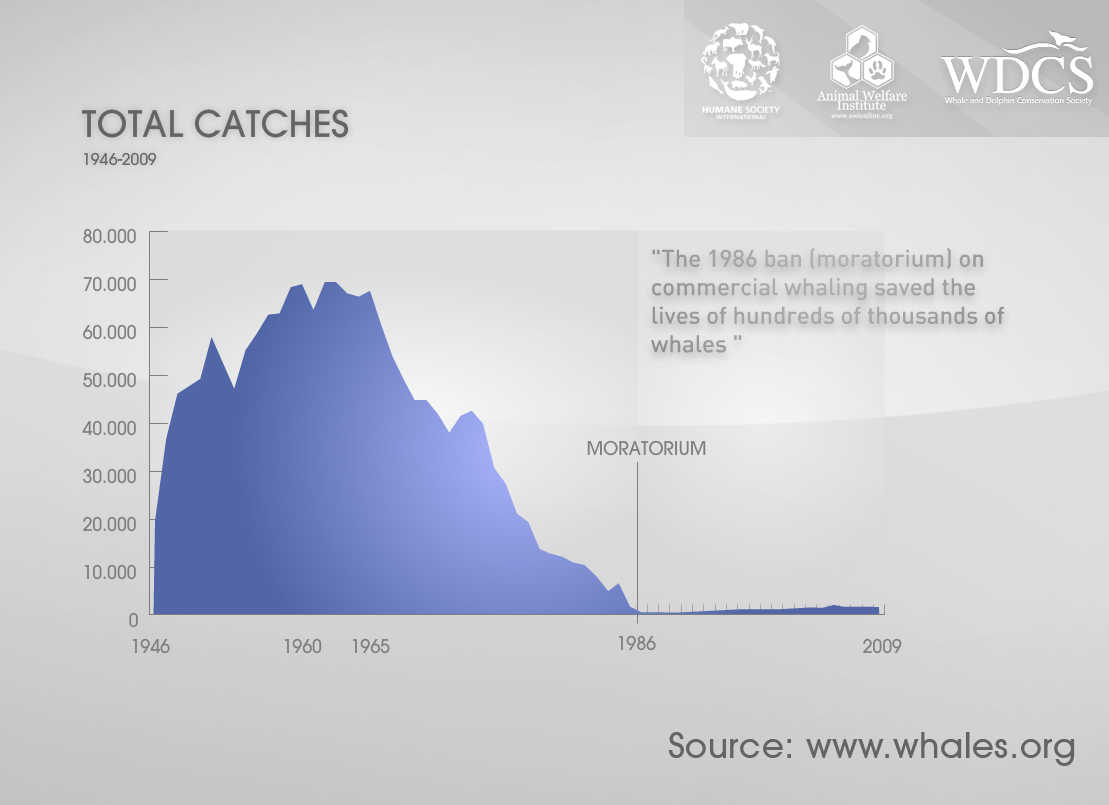A new report by WDCS –
Reinventing the
Whale – released today reveals the real
reason behind the whaling nations desire to lift the whaling moratorium –
they have long-term plans to develop new commercial applications for
whale oil including in pharmaceuticals and animal feed.
WDCS will use these findings at the current meeting of the International Whaling Commission to argue against a proposal to lift the whaling ban for ten years. We believe that a decade of legitimacy for commercial whaling would give Norway, Iceland and Japan an incentive to keep their whaling industries afloat, and allow them time to complete their research and development of new whale products.
We anticipate they will use these new pharmaceuticals, health supplements, animal feed and personal care products to soften global opposition to whaling and challenge the international ban on international trade in whale products by CITES, the Convention on International Trade in Endangered Species – the only current impediment to their global commercial aspirations.
The report explains how the decimation of whale populations in the 19th and 20th century was driven, not by demand for whale meat, but for blubber and other fatty tissues, which were rendered into complex oils to provide ingredients for a rapidly industrializing world. Whale oil was used in the manufacture of animal feed, machine lubricants, soap, detergents and margarine, while spermaceti from the sperm whale became a staple in cosmetics and, later, even as a lubricant for the aerospace programme.
To prevent another oil rush on whales, and a return to the dark days of industrial whaling for oil, WDCS believes that it is imperative that reform of the IWC include a swift phase-out to zero of all commercial, including scientific, whaling, backed by a permanent ban on international commercial trade in whale parts and derivatives and the immediate removal of all CITES reservations relating to whales.
Download the report: Reinventing the Whale
 WDCS, AWI and HSI have launched an
animated online-tool to provide all the facts and figures the public needs to
know about whaling. Whaling in the 21st Century and Before shows the
total number of whales killed since 1946, the enormous success of the
international ban on commercial whaling and continued whaling activities
by Iceland, Norway and Japan.
WDCS, AWI and HSI have launched an
animated online-tool to provide all the facts and figures the public needs to
know about whaling. Whaling in the 21st Century and Before shows the
total number of whales killed since 1946, the enormous success of the
international ban on commercial whaling and continued whaling activities
by Iceland, Norway and Japan.
We believe this whaling meeting will only be won by the will of the public at large. We urge you to keep the e-protests coming in. Tell your friends and ask them to help. The more pressure Governments feel right now, the better chance we have. If you can donate to help us to continue the fight.
Visit wdcs.org often. We will have lots of news for you as this important meeting unfolds.
WDCS will use these findings at the current meeting of the International Whaling Commission to argue against a proposal to lift the whaling ban for ten years. We believe that a decade of legitimacy for commercial whaling would give Norway, Iceland and Japan an incentive to keep their whaling industries afloat, and allow them time to complete their research and development of new whale products.
We anticipate they will use these new pharmaceuticals, health supplements, animal feed and personal care products to soften global opposition to whaling and challenge the international ban on international trade in whale products by CITES, the Convention on International Trade in Endangered Species – the only current impediment to their global commercial aspirations.
The report explains how the decimation of whale populations in the 19th and 20th century was driven, not by demand for whale meat, but for blubber and other fatty tissues, which were rendered into complex oils to provide ingredients for a rapidly industrializing world. Whale oil was used in the manufacture of animal feed, machine lubricants, soap, detergents and margarine, while spermaceti from the sperm whale became a staple in cosmetics and, later, even as a lubricant for the aerospace programme.
To prevent another oil rush on whales, and a return to the dark days of industrial whaling for oil, WDCS believes that it is imperative that reform of the IWC include a swift phase-out to zero of all commercial, including scientific, whaling, backed by a permanent ban on international commercial trade in whale parts and derivatives and the immediate removal of all CITES reservations relating to whales.
Download the report: Reinventing the Whale
 WDCS, AWI and HSI have launched an
animated online-tool to provide all the facts and figures the public needs to
know about whaling. Whaling in the 21st Century and Before shows the
total number of whales killed since 1946, the enormous success of the
international ban on commercial whaling and continued whaling activities
by Iceland, Norway and Japan.
WDCS, AWI and HSI have launched an
animated online-tool to provide all the facts and figures the public needs to
know about whaling. Whaling in the 21st Century and Before shows the
total number of whales killed since 1946, the enormous success of the
international ban on commercial whaling and continued whaling activities
by Iceland, Norway and Japan.We believe this whaling meeting will only be won by the will of the public at large. We urge you to keep the e-protests coming in. Tell your friends and ask them to help. The more pressure Governments feel right now, the better chance we have. If you can donate to help us to continue the fight.
Visit wdcs.org often. We will have lots of news for you as this important meeting unfolds.
Related programs linksKilling and trade |



 Twitter
Twitter Facebook
Facebook YouTube
YouTube Flickr
Flickr WDCS blog
WDCS blog